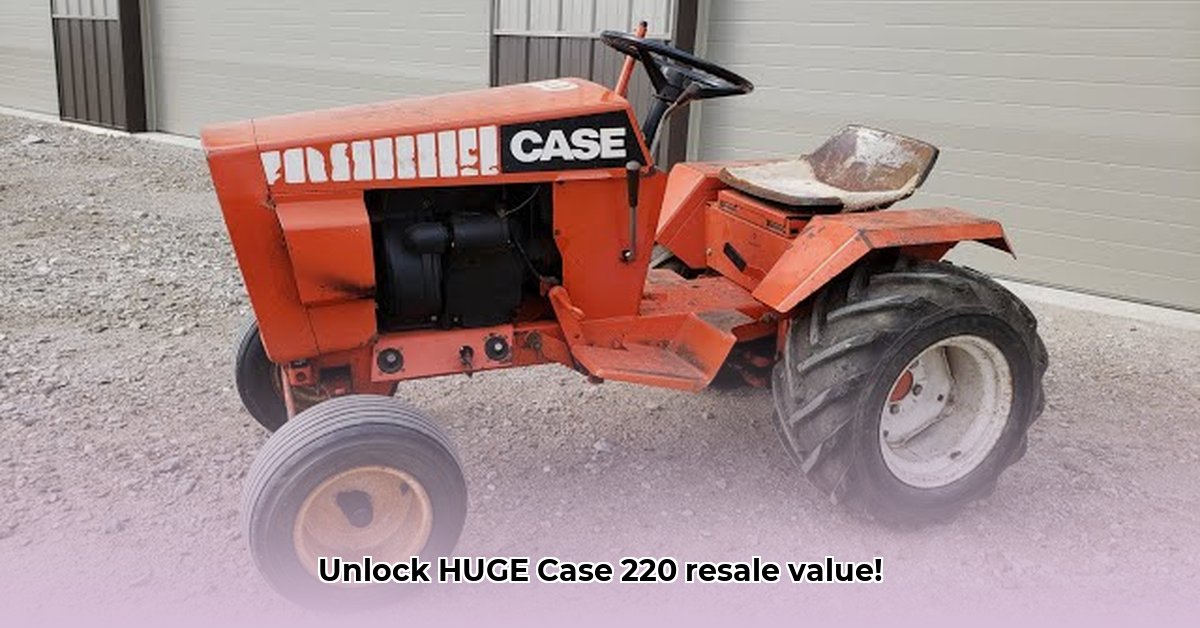
Assessing Your Case 220: A Comprehensive Evaluation
Determining the true value of a used Case 220 garden tractor can be challenging. Numerous factors influence its worth, including condition, available attachments, and current market demand. This guide provides a step-by-step approach for both buyers and sellers to navigate this process effectively. Let's begin with a thorough assessment of the tractor's condition. For more Case tractor information, see the Case Tractor Resource.
Mechanical Inspection: The Heart of the Matter
Before even considering price, perform a detailed mechanical inspection. This is crucial for both sellers aiming for top dollar and buyers seeking to avoid costly surprises.
Engine Evaluation: Start by assessing the engine's health. Does it start easily? Listen for unusual noises—knocking, ticking, or squealing—indicating potential problems. Check fluid levels (oil, coolant) and inspect belts and hoses for wear and tear. A well-maintained engine significantly increases the tractor's value. Don't forget to check the compression.
Transmission Troubleshoot: Shift through all gears. Smooth shifting is essential. Any grinding, hesitation, or difficulty indicates potential transmission problems, significantly impacting resale value.
Hydraulic System Check (if applicable): If your Case 220 has a hydraulic system, test its functionality thoroughly. Look for leaks, listen for unusual noises, and ensure smooth operation of any hydraulically-powered implements.
Cosmetic Assessment: First Impressions Count
While functionality is paramount, the tractor's cosmetic condition also influences its value.
Exterior Inspection: Note any rust, dents, or scratches. While a perfect paint job isn't necessary, a clean and well-maintained exterior always makes a positive impression. Consider the overall aesthetic appeal; a well-presented tractor sells faster and for a better price.
Attachments Evaluation: Carefully inspect any included attachments (mower deck, snow blade, tiller, etc.). Document their condition – are they functional? Do they require repairs? Working attachments significantly increase the tractor's overall value.
Pricing Your Case 220: Researching the Market
Having thoroughly assessed the condition of your Case 220, the next step is accurate market research to determine a fair price.
Researching Comparable Sales: Finding Your Benchmarks
Online Marketplaces: Explore online marketplaces (eBay, Craigslist, Facebook Marketplace) and specialized agricultural equipment websites. Focus on completed listings—these reveal actual sale prices, providing a realistic benchmark.
Local Listings and Auctions: Check local classifieds and farm equipment auctions. Local market trends significantly influence prices. A tractor highly desired in one region might be less valuable in another.
Calculating Fair Market Value: Putting it All Together
With detailed market research, you can now estimate the fair market value.
Base Value: Start with the average price of comparable Case 220 tractors in similar condition, factoring in the year and hours of operation.
Condition Adjustment: Adjust the base value upward or downward based on your condition assessment. Major mechanical issues warrant significant price reductions. Conversely, exceptional condition justifies a premium.
Attachment Value: Add the value of included, functional attachments. Research the prices of these attachments separately to determine their contribution to the overall value.
Preparing Your Case 220 for Sale: Enhancing its Appeal
Presenting your Case 220 attractively can significantly impact its sale price.
Cleaning and Detailing: Thoroughly clean the tractor, removing dirt, debris, and grime. Consider professional detailing for a showroom-ready finish.
Minor Repairs: Prioritize cost-effective repairs that improve functionality and address any obvious mechanical or cosmetic flaws.
High-Quality Photography: Take clear, well-lit photographs showcasing the tractor's condition and all its features.
Buying a Case 220: A Buyer's Guide
For buyers, due diligence is crucial to avoid costly mistakes.
Pre-Purchase Inspection: Essential for Buyers
Thorough Inspection: Before committing to a purchase, bring a mechanic or someone with significant mechanical knowledge to thoroughly inspect the tractor. Examine everything – engine, transmission, hydraulics, and all attachments.
Test Drive: If possible, run the tractor through its paces to assess its performance and identify any hidden problems.
Negotiation Strategies: Reaching a Fair Price
Market Research: Use your market research to support your price negotiations. Don't hesitate to negotiate based on the tractor's condition and your findings.
Contingency Plans: Be prepared to walk away if the price doesn't align with your research and inspection findings.
Risk Assessment: Potential Pitfalls and Mitigation Strategies
Buying or selling a used tractor carries inherent risks.
| Risk Factor | Probability | Impact | Mitigation Strategy |
|---|---|---|---|
| Major Mechanical Issues | Medium | High | Thorough pre-purchase inspection; negotiate a price reflecting identified issues |
| Overpaying | High | Medium | Extensive market research; don't rush into a decision. |
| Hidden Problems | Medium | High | Detailed inspection; consider a professional pre-purchase inspection. |
| Scams | Low | High | Verify seller credentials; secure payment methods; meet in person. |
By following these steps, both buyers and sellers can confidently navigate the process of buying or selling a used Case 220 garden tractor, ensuring a fair and satisfactory transaction. Remember, thorough research, careful inspection, and effective negotiation are key to maximizing value.